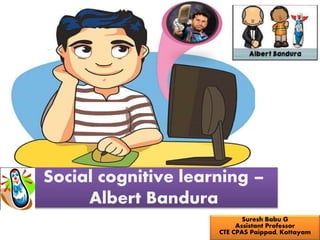
Social cognitive learning – Albert Bandura
- 1. Suresh Babu G Assistant Professor CTE CPAS Paippad, Kottayam Social cognitive learning – Albert Bandura
- 2. The Social Cognitive Theory Social Cognitive Theory (SCT) started as the Social Learning Theory (SLT) in the 1960s by Albert Bandura. It developed into the SCT in 1986 and posits that learning occurs in a social context with a dynamic and reciprocal interaction of the person, environment, and behavior The social-cognitive theory is a theoretical perspective in which learning by observing others is the focus of study.
- 3. Bandura's social learning theory emphasizes the importance of observing and modeling the behaviors, attitudes, and emotional reactions of others. Social learning theory explains human behavior in terms of continuous reciprocal interaction between cognitive, behavioral, and environmental influences. Bandura's social-cognitive theory is based on the triadic reciprocity model in which behavior, personal traits and the environment interact. Vicarious reinforcement and punishment also play a role in determining whether an individual will choose to engage in a behavior or not. Through his research, Bandura observed that components of learning occur though observation and modelling behaviors
- 5. Basic Assumptions of Social Cognitive Theory Social-cognitive theory is grounded by several basic assumptions. People can learn by observing others. Internal process may or may not lead to a behaviour Goal-directed behaviour Behaviour eventually becomes self-regulated Punishment and reinforcement have indirect effects on the learning process (Hurst, 2014).
- 6. Factors or Steps in Social learning theory Four important factors in social learning (Observational learning) Attention Pay attention to the model is a condition for learning Retention Remembering what the model did is a condition for imitating the model’s behaviour Reproduction People must have a capacity (eg. Skills) for imitating the behaviour Motivation People may be motivated to imitate behaviour (eg. Importence of model or reward) imitating
- 9. Key Constructs of Social Cognitive Theory Key constructs of social cognitive theory that are relevant to nutritional intervention include • Observational learning, • Reinforcement, • Self-control, and • Self-efficacy
- 10. Reinforcement Bandura and Walters emphasize the importance of reinforcement in situations where a person observes the actions of another person (model) who is reinforced or punished for these actions. Three Forms of Reinforcement 1. Direct Reinforcement - Occurs when an individual watches a model perform, imitates that behavior and is reinforced or punished by some individual. Eg. Saying vary good
- 11. 2. Vicarious Reinforcement - The observer anticipates receiving a reward for behaving in a given way because someone else has been so rewarded. Eg. When one study in advance like other. 3. Self –Reinforcement - The individuals strives to meet personal standards and does not depend on or care about the reaction of others.
- 12. Model Behaviour Imitation is influenced by the nature of reinforcement. Models may be divided into: 1. Real life models – it includes teachers, parents, friends, film actors, sports stars etc. 2. Symbolic models – It includes verbal material, pictorial and representation (film and TV) written materials, books etc. Both type of models are equally effective in learning
- 14. Factors influencing Social Learning • Stimulus properties of the model – model’s age, sex and economic status , and similarity of models. • Types of behaviour exemplified by the model – Novel skills, Hostile or aggressive response and standard self reward. • Consequences of model’s behaviour – rewared behaviour is likely to be imitated.
- 15. Key Concepts • Self-Efficacy - A person’s belief that they can successfully perform behaviors that will produce desired effects. Judgment of personal capacity. • Simulation – Simulation may be defined as a role- playing in which the process of teaching is enacted artificially, and an effort is made to practice some important skills of communication. Simulation is the basis of sensitivity training, socio- drama, role-playing, and psychodrama. Simulation
- 16. Educational implications of Social Cognitive Theory Students learn by observing and imitating , so give experiments, display materials, introduce model persons. Stress importance to rewards and punishments in learning. Develop soci-cultural relation between teacher and student Need of audio visual aids in teaching-learning Organization of multiple activity in learning Use modeling for health education , life-centered and productive educational practice Include role play , simulation, experimentation etc
